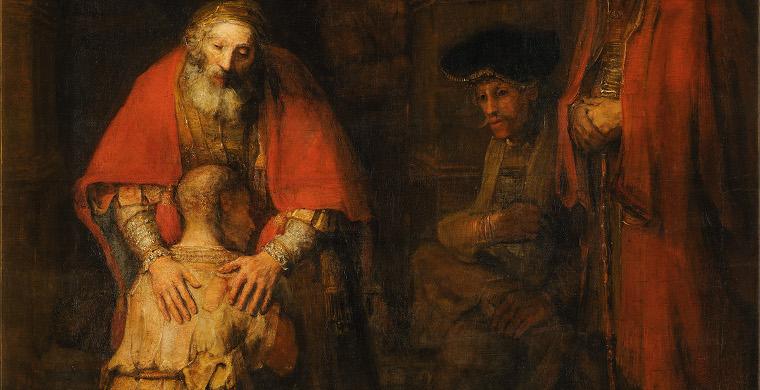ST. PETERSBURG: Rembrandt and the Prodigal Son
By David Virtue in Russia
www.virtueonline.org
September 7, 2015
I am standing in front of one of the most famous paintings in all history in one of the most famous art museums in the world - The Hermitage in St. Petersburg. Before me is Rembrandt's The Prodigal Son. Tourists press in on all sides, but I am alone, lost in the painting.
Rembrandt has captured a biblical moment as no other painter has done. His ability to understand human nature to reveal human expression is beyond words. I am transfixed. Rembrandt is the master of the complex emotion just as Caravaggio is the master of light and shadow.
Rembrandt captures both darkness and light in his paintings, but in the prodigal son it is all about light.
The father's face captures the joy of the returning son as well as the sadness that it took all this time for his lost son to return.
Why am I so moved? What is it that touches me so deeply? The son, almost shoeless, his outer clothes sold for money, his inner clothing torn and filthy, but still reflecting his earlier life of wealth and privilege. Rembrandt has missed nothing.
And then it hits me. I see the hands of the father. They are different. His right hand is masculine, his left hand is feminine. Is Rembrandt trying to tell us something about the nature of God? What is Rembrandt telling us? Is The Waiting Father (the title of Helmut Thielicke's book) the real center and focus of the story?
Perhaps we have had it all wrong. Preachers have universally focused on the prodigal son instead of the waiting and loving father.
Perhaps we have focused on the son because we can distance ourselves from him or, conversely, see ourselves in him. How many prodigals do we really know? I was not a prodigal son, but left home afraid and fearful of a father who I thought and, perhaps hoped, I would never see again. Today, many of us have spiritually prodigal children.
Rembrandt focuses on the father and therein lies the heart of the story. It is the father who loves and waits and waits and waits.
When he sees the son afar off, he does something totally out of character as Middle East scholar Kenneth Bailey suggests in his book. It was considered a humiliation for a middle-aged man to run and to lift his robe exposing his legs as he ran. But he does precisely that and runs towards the son he loved and kisses him.
I am filled with emotion. The hands tell it all. One is rough and hairy, the other is soft and feminine. The two are met together in the embrace of the son. It suggests both mothering and fathering at the same time -- a beautiful picture of our Heavenly Father. It is a message of mercy and forgiveness.
On the wall opposite the Prodigal Son is another portrait by the master - the sacrifice of Isaac. The two stand in juxtaposition. The agonized, determined face of the father about to slaughter his son...the angel knocks the knife out of his hand and now it hangs midair. Isaac is saved...the prodigal too is saved. Both sons, loved of their father, tell us about a God who loves us and who we are called to love and worship even if our own fathers are less than adequate examples and role models.
I am in internal pain. And then it hits me. I hear the words of St. Paul in my head, "God is our father under which every family in heaven and on earth is named" (Eph. 3:15).
I instantly feel at peace. We all experience the love of God in varying degrees, even as we experience human love. We are loved by God however inadequately we accept, understand or even experience it.
We grow up, we marry, we become fathers ourselves, determined not to repeat the sins of our fathers.
I leave The Hermitage with my wife determined to be a better father knowing that God has no grandchildren and that one day I will answer for my own fatherhood.
We step out into the midday sun of St Petersburg one of the most magnificent cities in the world. My mind is in a whirl, but strangely at peace. I have felt and learned and grown just a little bit more.
END














